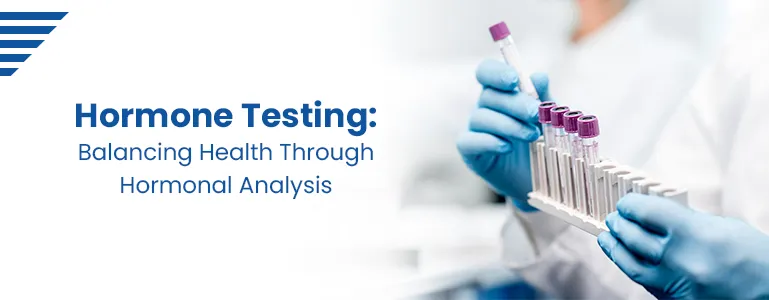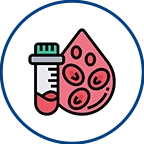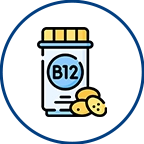Hormone Testing: Balancing Health Through Hormonal Analysis

Hormones, the messengers of the body, play a pivotal role in regulating various bodily functions. From metabolism and mood to growth and reproduction, hormones influence almost every aspect of our well-being. Maintaining a harmonious balance of hormones is essential for optimal health. Hormone testing, a crucial diagnostic tool, helps uncover imbalances and offers insights that guide healthcare decisions. In this blog, we'll explore the significance of hormone testing and the diagnostic tests that provide valuable hormonal analysis.
The Hormonal Symphony Within Us
Imagine your body as a symphony, and hormones as the musicians playing their part to create perfect harmony. When even one musician is off-key, the entire symphony can be affected. Similarly, hormonal imbalances can disrupt the intricate workings of the body. Imbalances can stem from various factors such as age, stress, genetics, and certain medical conditions.
Home Sample Collection
Why Hormone Testing Matters
Hormone testing is a critical aspect of preventive healthcare, as it allows for early detection and intervention. By identifying hormonal irregularities, healthcare professionals can tailor treatments to restore balance and alleviate symptoms. From women's health issues like polycystic ovary syndrome (PCOS) to thyroid disorders and adrenal dysfunction, hormonal imbalances can lead to a range of health concerns.
Diagnostic Tests for Hormonal Analysis
Blood Tests: Blood Tests are the most common method for hormone testing. Tests like the thyroid function panel measure levels of thyroid hormones (T3, T4) and Thyroid-stimulating hormone (TSH). Blood tests can also assess reproductive hormones, such as estrogen, progesterone, and testosterone.
Saliva Tests: Saliva tests are non-invasive and can measure free, unbound hormone levels. They are commonly used for assessing cortisol levels, which play a crucial role in managing stress. Saliva tests are useful for tracking hormone levels throughout the day.
Urine Tests: Urine tests provide insights into hormone metabolites, offering a comprehensive view of hormonal activity. They are particularly helpful in evaluating sex hormone imbalances and adrenal function.
Hormone Panels: Comprehensive hormone panels offer a broader perspective on hormonal health. These panels assess multiple hormones, giving healthcare providers a more comprehensive overview of potential imbalances.
Navigating Hormonal Imbalances
Understanding the symptoms of hormonal imbalances is key to seeking timely diagnosis and treatment. Common symptoms include fatigue, weight gain, mood swings, irregular periods, hair loss, and skin changes. However, it's important to note that hormonal imbalances can vary widely and may present differently in each individual.
Conclusion
Hormone testing empowers individuals to take proactive control of their health. Hormonal imbalances can be managed early on to enhance quality of life and lower the chance of developing chronic illnesses. Working together with a healthcare professional is crucial to understanding test results and creating a specialized treatment plan that is catered to your particular requirements. In the symphony of our bodies, hormonal balance is the melody that ensures harmony and vitality. Through hormone testing and expert guidance, we can fine-tune the symphony and embrace a life of well-being and equilibrium.
Frequently Asked Questions
What is hormone testing, and why is it important for health?
Hormone testing involves analyzing levels of various hormones in the body to detect imbalances. Hormone imbalances can cause health problems since they regulate many body processes. Testing helps identify these imbalances early, allowing for appropriate interventions.
What are the common symptoms of hormonal imbalances?
Hormonal imbalances can manifest in various ways, including fatigue, weight changes, mood swings, irregular periods, hair loss, and skin problems. However, symptoms can be diverse and vary depending on the specific hormones involved.
What types of hormones are typically tested?
Hormone testing covers a range of hormones, including thyroid hormones (T3, T4, TSH), sex hormones (estrogen, progesterone, testosterone), cortisol (stress hormone), insulin, and more. The selection of hormones tested depends on the individual's health concerns and symptoms.
How is hormone testing performed?
Hormone testing is commonly done through blood, saliva, or urine samples. Blood tests are widely used for general hormone assessments, while saliva tests offer insights into daily hormone fluctuations. Urine tests provide information about hormone metabolites.
When should I consider hormone testing?
Consider hormone testing if you're experiencing persistent symptoms like fatigue, mood swings, or changes in weight and have a suspicion of hormonal imbalance. Additionally, individuals with a family history of hormonal disorders may benefit from proactive testing.
Can hormone testing help diagnose specific conditions?
Yes, hormone testing can help diagnose various conditions such as thyroid disorders, polycystic ovary syndrome (PCOS), adrenal dysfunction, and more. However, testing results are often part of a comprehensive diagnostic approach and should be interpreted by a healthcare professional.
How can hormone testing contribute to treatment and well-being?
Hormone testing provides valuable insights that guide treatment plans. By identifying hormonal imbalances, healthcare providers can tailor interventions, which may include lifestyle changes, hormone therapy, nutritional adjustments, or stress management techniques. This personalized approach can lead to improved well-being and symptom relief.
Book Your Slot
Our Locations Near You in Hyderabad
3KM from Banjara Hills
1.9KM from Yusufguda
3KM from Madhura Nagar
5KM from Shaikpet
Profiles
- Cardiac Risk Profile
- Pituitary marker Profile
- Rheumatoid Arthritis Profile
- Dengue Fever Panel
- Lung Cancer Panel 1 Complete Molecular
- Gastroenteritis Screening Panel
- Thyroid Profile (T3,T4,TSH), Serum
- Pancreatic Marker Profile
- STD profile
- Androgen Profile
- Lipid Profile, Serum
- Pancreatic(acute)Profile
- PCOD Profile
Radiology
Pathology Tests
- Glucose Fasting (FBS),Sodium Fluoride Plasma
- Creatinine, Serum
- Glycosylated Hemoglobin (HbA1C)
- Vitamin B12 (Cyanocobalamin), Serum
- Thyroid Stimulating Hormone (TSH) Ultrasensitive, Serum
- Complete Urine Examination (CUE), Urine
- Liver Function Test (LFT),Serum
- Dengue (IgG & IgM), Serum
- Dengue Antigen (Ns1) Rapid, Serum
- C-Reactive Protein (CRP), Serum
- Widal (Slide Method), Serum
- Total IgE, Serum




